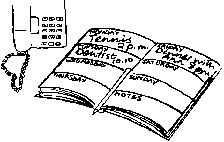|
Present continuous (I am doing) with
a future meaning
Study this example situation:
 |
This is Tom's diary for next week.
He is playing tennis on Monday afternoon.
He is going to the dentist on Tuesday morning. He
is having dinner with Ann on Friday.
In all these examples, Tom has already decided
and arranged to do these things.
|
Use the present continuous to say what you have already arranged
to do. Do not use the present simple (I do):
- A: What are you doing on Saturday evening? (not
'what do you do')
B: I'm going to the theatre, (not 'I go')
- A: What time is Cathy arriving tomorrow?
B: At 10.30. I'm meeting her at the station.
- I'm not working tomorrow, so we can go out somewhere.
- lan isn't playing football on Saturday. He's hurt his leg.
'(I'm) going to (do)' is also possible in these sentences:
- What are you going to do on Saturday evening? But
the present continuous is more natural for arrangements. See also
Unit
20.
Do not use will to talk about what you have arranged to do:
- What are you doing this evening? (not 'what
will you do')
- Alex is getting married next month, (not 'will get')
Present simple (I do) with a future meaning
We use the present simple when we talk about timetables,
programmes etc. (for example, for public transport, cinemas etc.):
- The train leaves Plymouth at 11.30 and arrives in
London at 14.45.
- What time does the film begin?
- It's Wednesday tomorrow.
You can use the present simple for people if their plans are fixed
like a timetable:
- I start my new job on Monday.
- What time do you finish work tomorrow?
But the continuous is more usual for personal arrangements:
- What time are you meeting Ann tomorrow? (not
'do you meet')
Compare:
- What time are you leaving tomorrow?
but:
- What time does the train leave tomorrow?
- I'm going to the cinema this evening.
but:
- The film starts at 8.15 (this evening).
|
